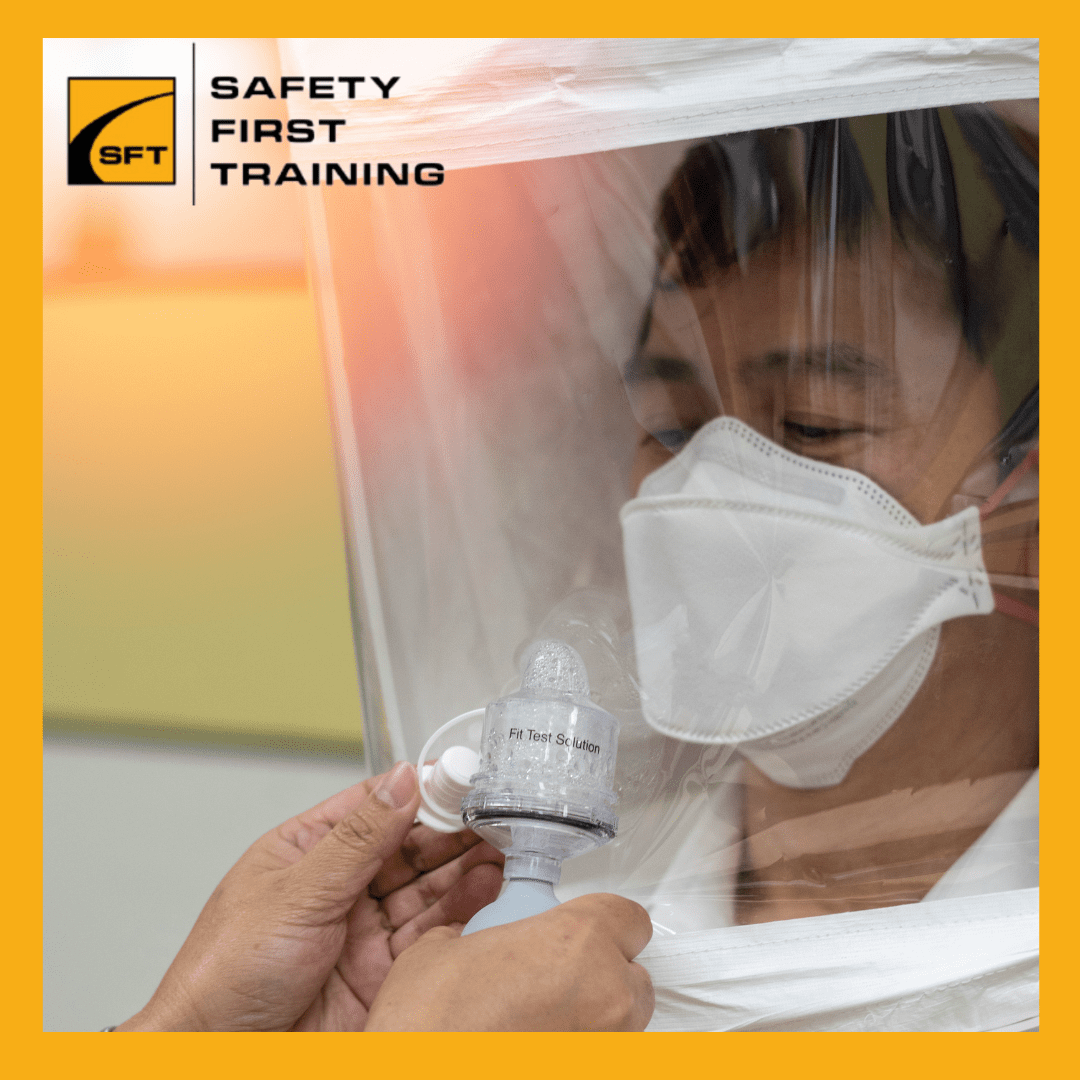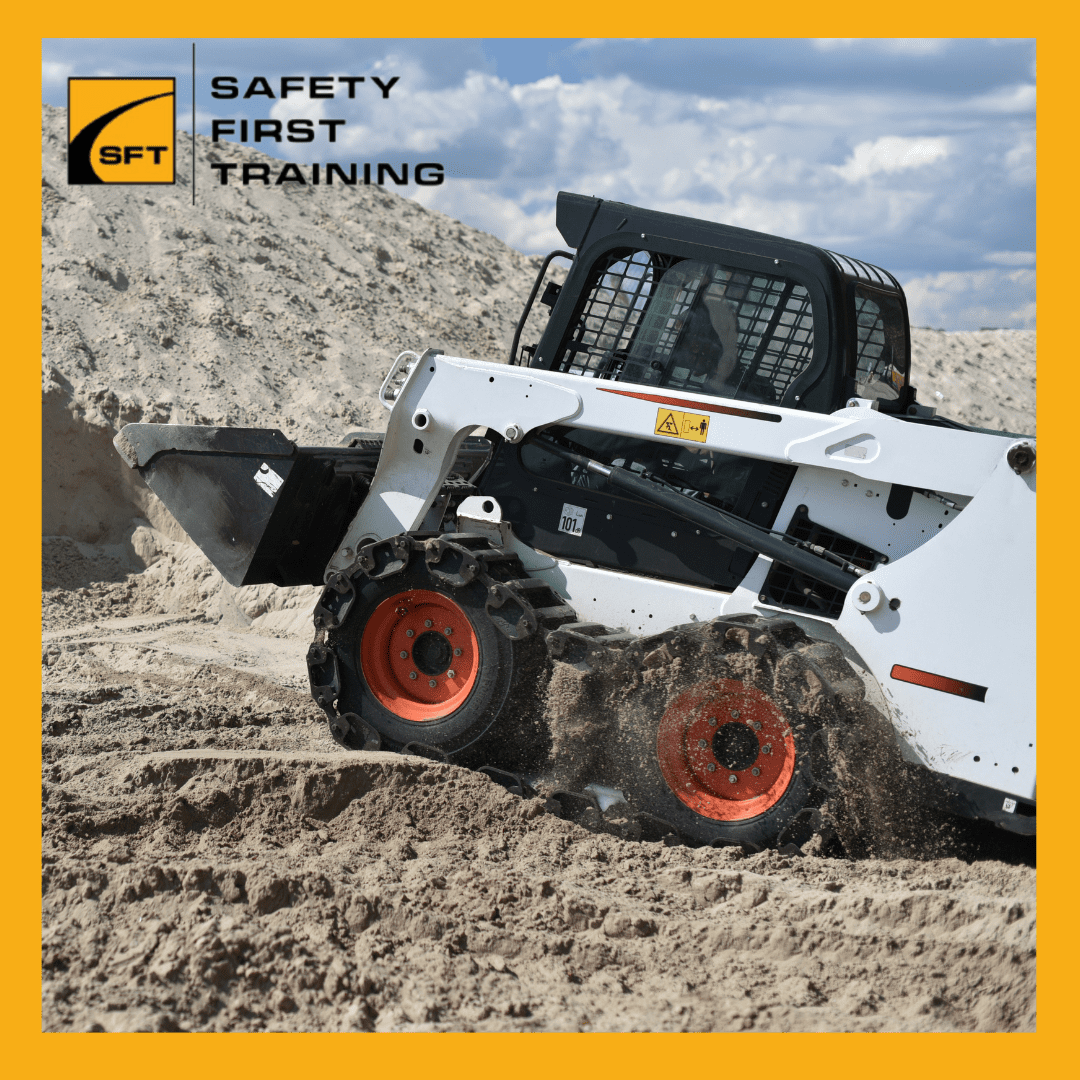QUALITATIVE RESPIRATOR MASK FIT TESTING AND CERTIFICATION
Respirator Mask Fit Testing from Safety First Training meets CSA Standard Z94.4 Respiratory Regulations that certifies N95, half mask and full face mask fit tests. This Respirator Protection Training session is focused on the importance of proper respirator protection, the selection of the appropriate mask for the workplace, inspection of the mask, proper mask fit and seal test, cleaning and storage of the masks. If you are a healthcare worker, a proper N95 Mask Fit Testing program is required when treating patients with diseases like COVID-19 or when you are trying to reduce the risk of exposure to airborne viral transmissions. Our trainers are 3M Certified for Respiratory Mask Fit Testing.
Respirator Mask Fit Testing is offered exclusively onsite. Testing is offered throughout Ontario including Toronto, Mississauga, Brampton, Markham, Vaughan, Richmond Hill, Oakville, Burlington, Hamilton, Pickering, Ajax, Whitby, Oshawa, Milton, Georgetown, Aurora, Newmarket, Caledon, Barrie, Guelph, Kitchener, Waterloo, Cambridge, St. Catharines, Niagara Falls, Peterborough, Orangeville, Grimsby, Brantford, Stratford, Simcoe, Woodstock, Collingwood, Orillia, Port Hope, Kawartha Lakes, and more.
We also offer Respirator Mask Fit Testing – Train the Trainer courses.
Special Discounts and Preferred Pricing Offered, Contact Us Directly
Respirator Qualitative Mask Fit Testing Pricing
Mask Fit Test Session: $799.00 (up to maximum 12 people) based on one type of mask per person.
Additional participants: $59.00
If additional mask types per person are required for fit testing, additional charges will occur. (approx. 4 – 8 mask fits per hour can be conducted)
Respirator Quantitative Mask Fit Testing Pricing
Contact us directly as this will depend on mask type, environment, etc
For Train the Trainer Mask Fit Testing inquiries, please contact our office for pricing and availability.
Duration
Respirator Mask Fit Testing & Training takes approximately 10-15 minutes per person
Assessment
In order to receive a certificate, the participant must be able to successfully pass the administered taste test and demonstrate proper donning and doffing of the mask
Completion
Upon successful completion, participants will receive a PDF wallet card for their records
Respirator Mask Fit Testing & Respiratory Protection Training
Before you can be tested for Respirator Mask Fit Testing:
You must not smoke, eat, chew gum, drink any liquids (except water) at least 20 minutes prior to the test, to ensure an accurate, successful respirator mask fit test (All types of masks).
You must be clean shaven for the Respirator Protection Training testing procedure (see above picture for more details).
Note – As per Ontario Ministry of Labour rules, you must be re-certified for respirator 3M mask fit testing every 24 months.
Respirator mask fit testing is an essential component of respiratory protection programs in Ontario, as it ensures that the respirator being used by a worker fits properly and provides adequate protection against airborne hazards. The primary goal of fit testing is to identify the best respirator model and size for an individual worker and to ensure that the respirator forms a tight seal around their face, minimizing the risk of inhaling harmful substances.
In Ontario, fit testing is mandatory for all workers who are required to wear a respirator to perform their job duties. Employers are responsible for providing workers with the appropriate respirator and ensuring that it fits properly through fit testing. Fit testing is also required to be conducted at least once a year, or whenever a worker changes their respirator model or size.
Proper fit of a respirator is critical to protect against respiratory hazards like airborne pathogens, chemical vapors, and dusts. Poorly fitting respirators can leak, allowing contaminants to enter the worker's breathing zone, which can lead to health problems. Respirator fit testing helps ensure that the respirator forms a tight seal around the worker's face, minimizing the risk of inhaling harmful substances.
Respirator Mask Fit Testing is essential in Ontario to ensure the safety and protection of workers who are exposed to airborne hazards. Employers must provide appropriate respiratory protection equipment and conduct fit testing to ensure that the respirator fits properly and is effective in protecting the worker's respiratory system.
N95 Respirator Fit Testing
The respiratory protection device known as the N95 respirator mask is designed to have a very close facial fit and very efficient filtration of airborne particles. The edges of the N95 respirator are designed to form a tight-fitting seal around the nose and mouth. N95 masks are commonly used in healthcare settings. N95 Mask Fit Testing is required to be done very 24 months as per the OHSA. We can assist your company if you require N95 Mask Fit Testing in Toronto or N95 Mask Fit Testing in Mississauga or any other areas in the GTA.
Half Mask Respirator Fit Testing or Full Mask Respirator Fit Testing
Half Mask Respirators and Full Mask Respirators are designed to provide protection from many types of dusts, fogs, fumes, mists, gases, smokes, sprays, or vapors. In order to gain this protection, it is important that you have a proper fitting mask. Employees will only wear the same make, size, and model of respirator that they have been successfully fitted with during their mask fit test. This model will be chosen during the fit test, depending on comfort, facial structure, and size. Respirator Fit Testing in Ontario is required to be done very 24 months as per the OHSA. We can assist your company if you require Half Mask Respirator or Full Mask Respirator Fit Testing in Toronto or Half Mask Respirator or Full Face Respirator Fit Testing in Mississauga or any other areas in the GTA.
Cartridge selection will also be determined based on the employee’s specific protection needs. Typically, cartridges should be changed out when you feel a higher resistance in breathing or after approximately 8 hours of use.
Before wearing your respirator, inspect the unit for cracks, dents, deformations, heavy usage or loss of elasticity on the straps, old or brittle exhalation/inhalation valves, or any area that looks to be compromised. If there is a problem with the respirator, do not attempt to fix it; bring it to your manager to be repaired or replaced.
The respirator needs to be stored in a plastic bag, out of sunlight, and kept from temperature extremes. Also, this equipment should be maintained under your control, so that no one else uses or takes it. The respirator needs to be cleaned as often as necessary in order to be maintained in a sanitary condition. The most common way to clean it is by using either a warm, mild soapy solution, or alcohol wipes. Clean the inside of the mask first and work your way to the outside of the mask in order to minimize contaminating the inside of your respirator.
The Ontario Ministry of Labour-Prevention Division recently posted changes to workplace masking guidance to include additional information about mask fit and filtration. As of August 22, 2022, the document offers practical and technical information to:
• enable employers to better assess the appropriateness and effectiveness of different types and uses of masks
• help workplaces make the actions they choose more effective
• support businesses to be prepared to respond quickly, appropriately and with minimal disruption to any/all future waves of COVID-19
TRAIN THE TRAINER: MASK FIT TESTING
The emergence of new infectious diseases like Covid-19, potential re-emergence of past diseases and ongoing threat of other respiratory hazards has highlighted the need for healthcare and other industries to develop and implement formal respiratory protection programs to protect workers from infectious agents. Our Train The Trainer program provides participants with the knowledge and skills required to conduct their own qualitative fit testing (QLFT) as required by the legislation, and as outlined by the CSA Standard Z94.4-18. The course includes a practical component where participants can apply and practice their newly acquired skills in small groups.
This Train the Trainer Mask Fit Testing program is designed to educate and prepare workers for the testing and use of respiratory protection devices. This training is applicable to the healthcare sector, as well as to other sectors where respiratory protection is required. By the end of this course you will be able to:
Explain why respiratory protection programs and fit testing are important
Explain the implications of the routes of transmission
Outline the main legislative requirements and standards related to infectious diseases and respiratory protection programs
Describe types of particulate respirators and their selection, use, care and limitations
Describe the required elements of an effective respiratory protection program
Perform qualitative fit testing
Respirator Mask Fit Testing FAQ's
1. Why is Respirator Mask Fit Testing Necessary?
Respirator Mask Fit Testing is essential across various professions, particularly in healthcare. In the event of a disease outbreak, healthcare professionals like nurses and doctors must be able to quickly use a mask for protection against airborne pathogens. Similarly, in industries such as construction, fit testing is crucial to shield workers from hazards like dust, dirt, and harmful chemicals, which could cause severe health issues if inhaled without proper protection.
2. Understanding the N95 Mask
An N95 mask is a single-use, disposable mask. This mask is distinctive because the National Institute approves it for Occupational Safety and Health (NIOSH) and must be labelled as a surgical mask by the Food and Drug Administration (FDA).
3. Qualitative vs. Quantitative Fit Testing
Qualitative Fit Testing is commonly used for various workplace masks, including N95 and full or half-face respirators. It assesses the wearer's ability to taste a specific substance and is suitable for masks without their air supply.
In contrast, Quantitative Fit Testing uses a Portacount machine to precisely measure mask safety through a fixed air supply, providing a numerical fit factor rather than relying on sensory detection.
Both testing types are required at least every two years or more frequently if there have been significant changes to the wearer's facial features, such as weight fluctuation or facial hair growth. Only qualified instructors can perform these tests.
4. Arranging for Respirator Protection Training and a Mask Fit Test
To schedule a fit test, contact a certified trainer who can perform the test at your location. Alternatively, gather a group, secure a venue, and book a session by calling 905-672-3600.
5. Preparing for Your Mask Fit Test
Avoid eating, drinking, or smoking for at least 20 minutes before your test. You’ll need to complete a brief medical form before testing. Note that facial hair must be shaved as it prevents the N95 mask from sealing properly against the skin, leading to a failed test.
6. Fit Testing During Pregnancy
Pregnant women can safely undergo fit testing as the testing solutions used, such as Bitrex FT-31 and FT-32, are non-toxic and safe.
7. Replacement of Lost Certification Cards
If you lose your certification card, we can reissue it for a small fee, provided you have your company’s name and the approximate date of the initial testing. Remember, your fit test card expires every 24 months, and a current test is required for a replacement if the card has expired.
8. Dealing with Mask Shortages at Work
If your employer runs out of the specific masks you are certified to use, you cannot substitute them with a different model. Using a mask that doesn’t fit properly can lead to significant health risks.
9. Regulations on Respirator Protection and Mask Fit Testing
For detailed information on regulations pertaining to respirator protection and mask fit testing in Ontario, explore our website.
Click here to be connected to the Ontario Ministry of Labour’s website for explanations regarding Respirators and what you need to know.




